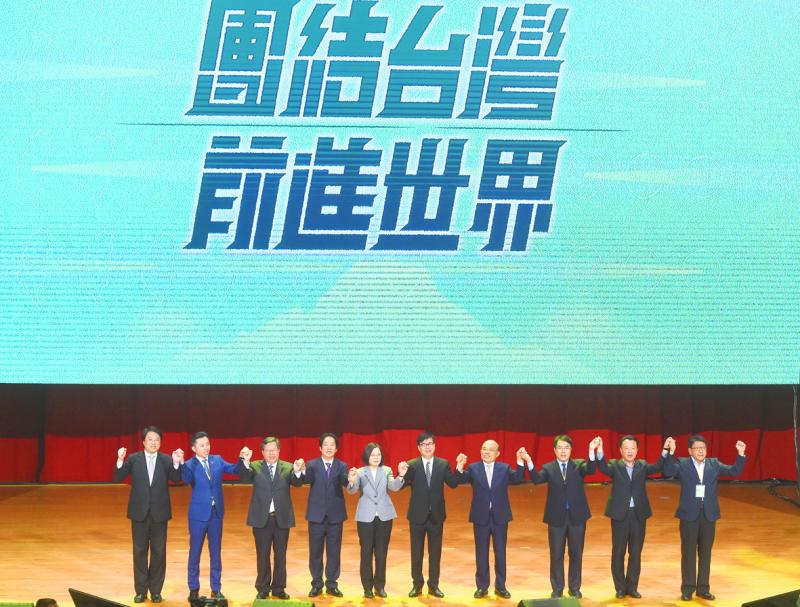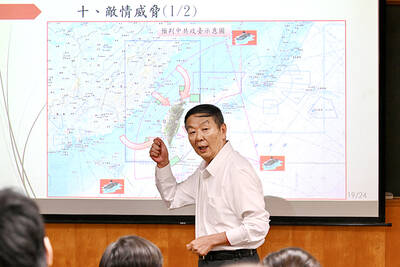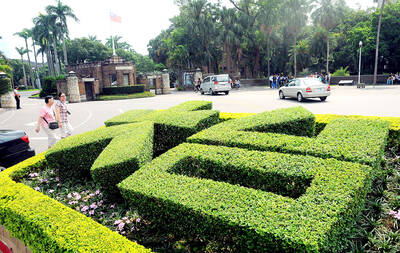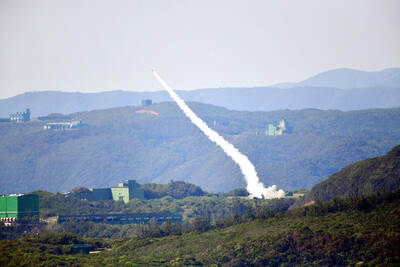Constitutional reform is one of the most important advancements for Taiwan, President Tsai Ing-wen (蔡英文) said yesterday, adding that items that should be prioritized include lowering the voting age from 20 to 18, and abolishing the Examination Yuan and the Control Yuan, as the issues have cross-party consensus.
Tsai made the remarks in a speech at the Democratic Progressive Party’s (DPP) national congress in Taipei, which she presided over in her capacity as party chairperson.
Tsai highlighted major missions for the party.

Photo: Chien Jung-fong, Taipei Times
First, the DPP should quickly propose guidelines on constitutional amendments related to lowering the voting age — along with other civil rights provided to citizens over 20 — as well as abolishing the Examination Yuan and the Control Yuan, so that party caucuses can discuss the issues at the legislature’s Constitutional Amendment Committee, Tsai said.
Tsai also called on opposition parties, saying that all parties should cherish the “constitutional moment.”
Second, the DPP should dedicate more resources to cultivating young talent for the nation, she said.
Third, the party should continue to deepen democracy in Taiwan and defend its democratic values amid global uncertainties, Tsai said, citing the situation in Hong Kong, where freedom and human rights have become seriously undermined after China imposed national security legislation on the territory.
As a party that survived totalitarian oppression, the DPP would share Taiwan’s experience in establishing democratic institutions with the international community, and support Hong Kongers fighting for democracy, Tsai said.
Fourth, the DPP should “recover its glory in Kaohsiung” by winning the city’s mayoral by-election, which is set for Aug. 15, she said.
Tsai also said that Taiwan’s economic recovery amid the COVID-19 pandemic has had a good start, as crowds were seen in various locations nationwide on the first weekend following the release of the government’s Triple Stimulus Vouchers, which she said was a sign of increased business opportunities.
However, the DPP cannot be complacent about its policy results, otherwise public support could slip away, Tsai said, telling party members that “integrity, diligence and love for the country” remain the party’s chief commitments.
Chinese Nationalist Party (KMT) spokeswoman Hung Yu-chien (洪于茜) said that constitutional reform should be carried out with cross-party consensus, but the Tsai administration does nothing but “exercise crushing tyranny of the majority.”
The attitude shows no respect for opposition parties and creates “extremely unequal power between the ruling and opposition parties” at the legislature, Hung added.
The KMT believes the DPP is bringing up abolishing the Examination Yuan and the Control Yuan to shift focus away from its incompetence at governing the nation and its tyrannical leadership, she said.
The KMT would establish a constitutional amendment committee comprising party members and academics to discuss issues, including the Examination Yuan and the Control Yuan, she said.
The KMT would not finalize its stance on the matter before that, she added.
New Power Party caucus whip Chiu Hsien-chih (邱顯智) said his party would support constitutional reform, as it would address issues that have long been unresolved.
Taiwan People’s Party Legislator Jang Chyi-lu (張其祿) agreed, saying that abolishing the two branches of government and lowering the voting age to 18 are also the party’s long-time appeals.
Additional reporting by Lin Liang-sheng and Hsieh Chun-lin

RETHINK? The defense ministry and Navy Command Headquarters could take over the indigenous submarine project and change its production timeline, a source said Admiral Huang Shu-kuang’s (黃曙光) resignation as head of the Indigenous Submarine Program and as a member of the National Security Council could affect the production of submarines, a source said yesterday. Huang in a statement last night said he had decided to resign due to national security concerns while expressing the hope that it would put a stop to political wrangling that only undermines the advancement of the nation’s defense capabilities. Taiwan People’s Party Legislator Vivian Huang (黃珊珊) yesterday said that the admiral, her older brother, felt it was time for him to step down and that he had completed what he

Taiwan has experienced its most significant improvement in the QS World University Rankings by Subject, data provided on Sunday by international higher education analyst Quacquarelli Symonds (QS) showed. Compared with last year’s edition of the rankings, which measure academic excellence and influence, Taiwanese universities made great improvements in the H Index metric, which evaluates research productivity and its impact, with a notable 30 percent increase overall, QS said. Taiwanese universities also made notable progress in the Citations per Paper metric, which measures the impact of research, achieving a 13 percent increase. Taiwanese universities gained 10 percent in Academic Reputation, but declined 18 percent

UNDER DISCUSSION: The combatant command would integrate fast attack boat and anti-ship missile groups to defend waters closest to the coastline, a source said The military could establish a new combatant command as early as 2026, which would be tasked with defending Taiwan’s territorial waters 24 nautical miles (44.4km) from the nation’s coastline, a source familiar with the matter said yesterday. The new command, which would fall under the Naval Command Headquarters, would be led by a vice admiral and integrate existing fast attack boat and anti-ship missile groups, along with the Naval Maritime Surveillance and Reconnaissance Command, said the source, who asked to remain anonymous. It could be launched by 2026, but details are being discussed and no final timetable has been announced, the source

SHOT IN THE ARM: The new system can be integrated with Avenger and Stinger missiles to bolster regional air defense capabilities, a defense ministry report said Domestically developed Land Sword II (陸射劍二) missiles were successfully launched and hit target drones during a live-fire exercise at the Jiupeng Military Base in Pingtung County yesterday. The missiles, developed by the Chungshan Institute of Science and Technology (CSIST), were originally scheduled to launch on Tuesday last week, after the Tomb Sweeping Day holiday long weekend, but were postponed to yesterday due to weather conditions. Local residents and military enthusiasts gathered outside the base to watch the missile tests, with the first one launching at 9:10am. The Land Sword II system, which is derived from the Sky Sword II (天劍二) series, was turned